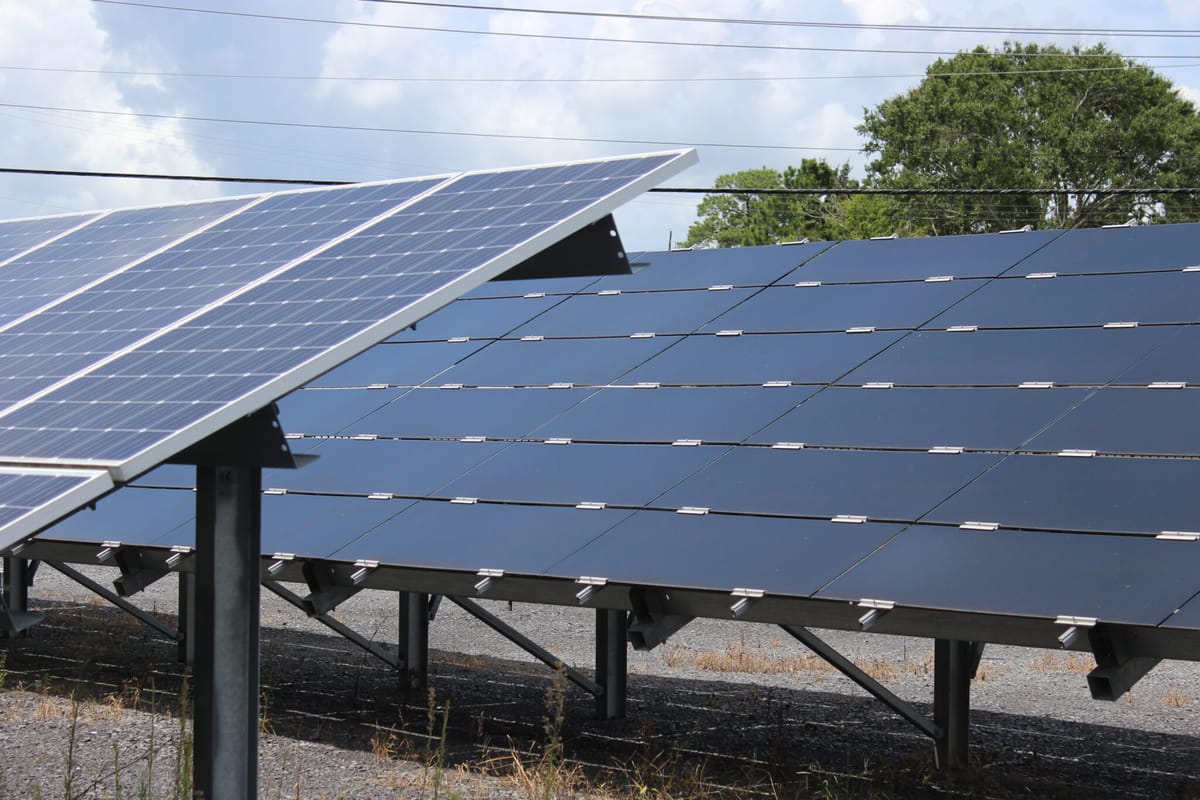What hinders Louisiana’s shift toward renewable energy? Voters say their congressional leaders
Despite generally liking renewable energy, the majority of Louisiana voters oppose efforts to shift the state away from oil and gas.

Published in WWNO, the Louisiana Illuminator, the Lens
Despite generally liking renewable energy, the majority of Louisiana voters oppose efforts to shift the state away from oil and gas, according to a survey released earlier this year by the Greater New Orleans Housing Alliance.
That opposition is mostly rooted in respondents’ beliefs that the state’s economy is too reliant on oil and gas to make a drastic pivot to renewable energy initiatives, such as wind and solar power, and they see their elected officials as a major roadblock to that happening any time soon.
“The politicians have sold their souls to the oil companies, and they’ll fight efforts to diversify (the state’s economy),” a Black male registered voter, who identified as an independent, said during focus group meetings related to the GNOHA survey.
Some of the key findings from the survey of 1,551 people throughout the state, the results of which had a margin of error of +/- 3.5%, showed about half of those surveyed, or about 49%, oppose renewables while 44% support them. The opposition is primarily driven by conservative Republicans and older white voters, according to the survey.
That split is not reflected, however, in the state’s delegation. Of the eight leaders representing the state in the U.S. Congress, only House Rep. Troy Carter, a New Orleans Democrat representing the state’s 2nd Congressional District, voted in favor of President Joe Biden’s Inflation Reduction Act, which focuses on reducing greenhouse gas emissions and mitigating the effects of climate change.
The delegation overwhelmingly voted against all initiatives in Congress dealing with climate change and clean energy, according to the 2021 scorecard released by the League of Conservation Voters, a watchdog group tracking key votes in Congress related to energy, climate change and environmental justice.
Multiple attempts were made to reach the state’s congressional delegation to comment on the survey results. Only Republican Rep. Garrett Graves, a Baton Rouge Republican representing the state’s 6th Congressional District, responded, defending his voting record.
In a written statement, Graves said the current cost of living, including fuel cost and surging electricity prices are all “a result of fatally-flawed policies attempting to force renewable energy technologies in ways they are not prepared to go.”
GNOHA, a New Orleans-based housing collaborative, commissioned the study, conducted by Global Strategy Group, to underscore how climate change, voting rights, criminal justice and a host of other issues are related to housing.
“The survey illuminated that we don’t have a lot of deniers when it comes to the effects of climate change,” said Andreanecia Morris, president and chairperson of the GNOHA.
“They feel it. They understand it. They also don’t think our leaders will do anything about it.”
There is also apprehension among Louisiana voters that a shift away from oil and gas will be difficult given the industry’s influence on lawmakers and its impact on the state’s economy, according to the survey.
Despite the perception of the industry’s strength, its contribution to the economy was just 11% of Louisiana’s gross domestic product in 2017, the Federal Reserve Bank of Atlanta reported in 2020.
Approximately 40% of respondents see the push to renewables as positive in terms of fighting climate change and lowering utility bills in the long term. But opponents are skeptical the renewable energy industry can create the same high-paying jobs as the oil and gas industry.
According to the “Clean Jobs, Better Jobs” report published in 2020 by E2, the American Council on Renewable Energy and the Clean Energy Leadership Institute, median salaries for jobs within the clean energy sector were comparable, and sometimes better, than those in the oil and gas industry. The report stated that jobs in coal, natural gas and petroleum pay about $24.37 an hour while jobs in solar and wind net about $24.85 an hour.
And in Louisiana, the average hourly rate for jobs in renewable energy is higher than the state’s median hourly rate, that report states. In 2019, the average clean energy wage was $20.98 an hour, which was 24.9% higher than the state’s median wage.
In the survey’s executive summary, GNOHA said respondents indicated the state is so reliant on the oil and gas industry that any shift toward renewable energy would have to be gradual.
“Surveys like this are helpful in that they’re the first step to calling someone out and showing how they’re misrepresenting public opinion,” said Joshua Basseches, assistant professor of public policy and environmental studies at Tulane University. “A well-conducted survey can be an important tool to begin holding politicians accountable.”
Basseches said politicians can misrepresent the public’s interest in clean energy initiatives and climate because residents aren’t voicing concern for those issues, while oil and gas lobbyists are making their industry’s opinions known.
Morris agreed, saying advocates within the green energy space aren’t the strongest negotiators when it comes to lobbying and public messaging.
“I’m not saying we’re looking for them to mimic the bad habits of the oil and gas industry, but we need them to speak with authority,” she said. “We have a group of leaders on both sides of the spectrum who would rather disenfranchise and discourage real engagement.”
Floodlight depends on a community of readers like you who are committed to supporting nonprofit investigative journalism. Donate to see more stories like this one.


